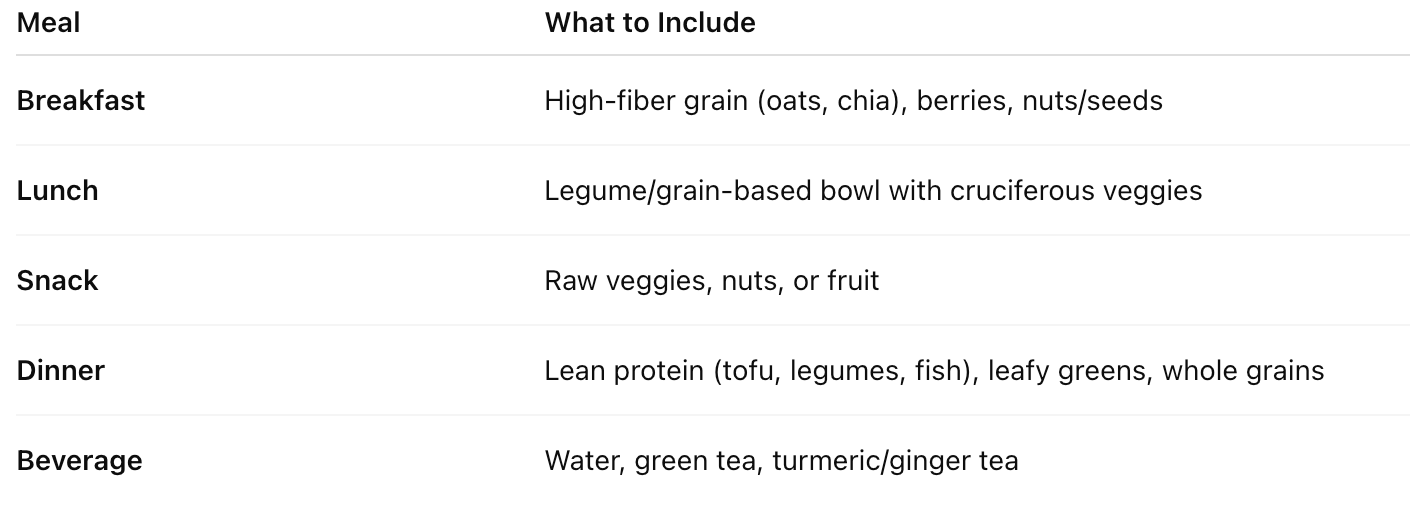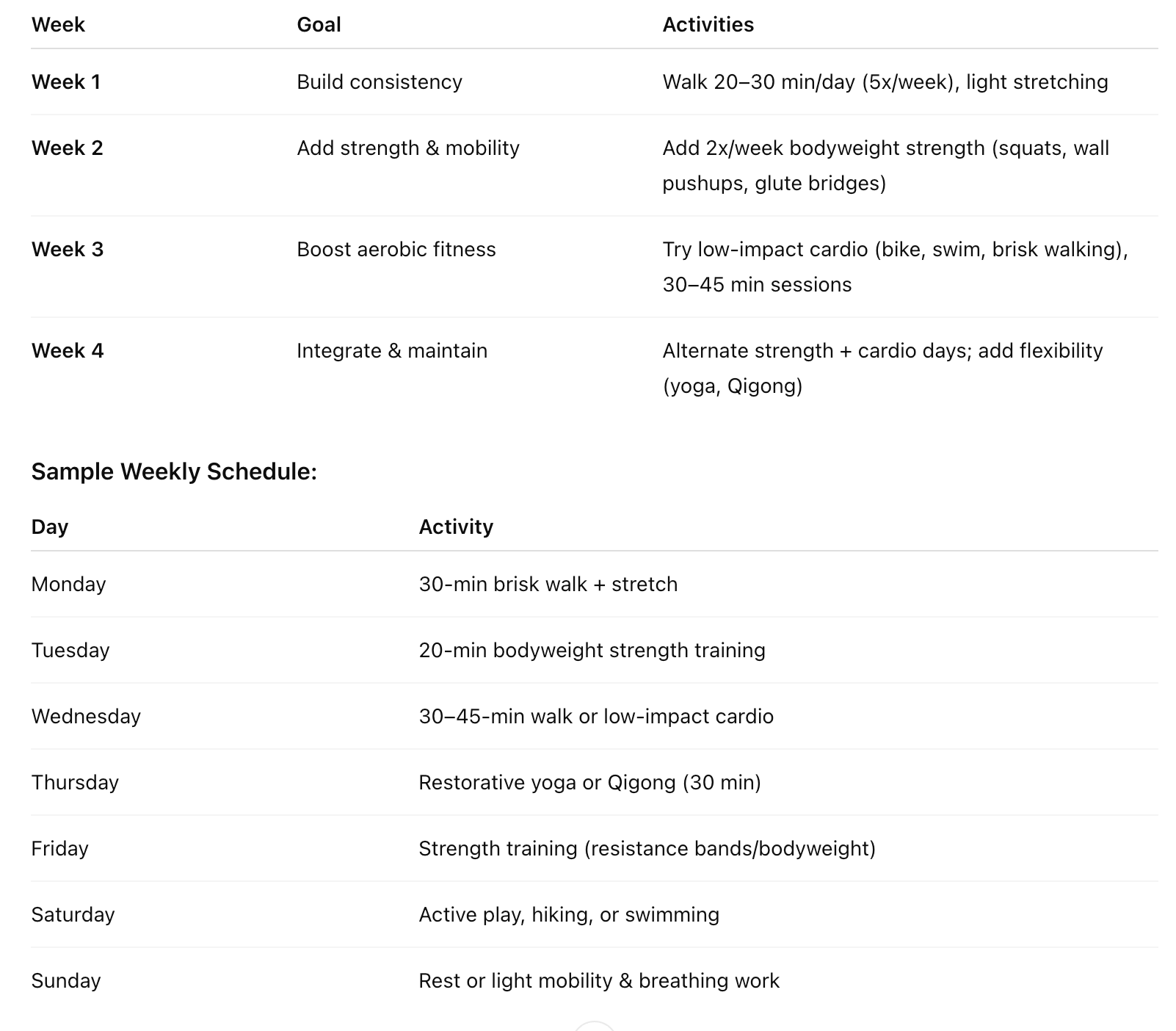
1-Month Cancer Prevention Plan: Beginner Diet & Exercise Guide
Jun 16, 2025Goal:
To reduce modifiable cancer risk through consistent, evidence-informed dietary and physical activity patterns designed for beginners.
Why It Matters
Research indicates that 30–50% of cancers are preventable through healthy lifestyle changes, particularly related to diet, physical activity, and weight management. This plan addresses key modifiable risk factors with realistic and sustainable strategies.
WCRF/AICR, 2018; ACSM, 2019; WHO, 2020
DIET PLAN OVERVIEW
Core Dietary Principles
-
Plant-forward meals: Focus on vegetables, fruits, whole grains, and legumes.
-
Limit red and processed meats
-
Minimize added sugar and ultra-processed foods
-
Include healthy fats (omega-3s, olive oil, seeds)
-
Hydrate well (prefer water, green tea, and herbal infusions)

WEEKLY ROTATION SAMPLE (Adjustable by Week)
Week 1: Gut & Fiber Focus
-
Goal: 30g+ fiber/day for colorectal cancer protection.
-
Staples: Lentils, oats, chia, apples, broccoli, flaxseed.
Aune et al., 2011; Slavin, 2013
Week 2: Cruciferous & Detoxification Support
-
Goal: Include daily servings of broccoli, kale, cauliflower, Brussels sprouts.
Verhoeven et al., 1996; Higdon et al., 2007
Week 3: Antioxidant-Rich Foods
-
Goal: Focus on polyphenols and flavonoids.
-
Staples: Berries, green tea, turmeric, garlic, ginger, dark leafy greens.
Seeram, 2008; Li et al., 2011
Week 4: Omega-3s & Anti-Inflammatory Eating
-
Goal: Include fatty fish (2x/week), walnuts, flax, turmeric.
Cockbain et al., 2012; Calder, 2015
EXERCISE PLAN OVERVIEW
Cancer-Preventive Exercise Goals
-
150 minutes of moderate aerobic activity per week (or 75 minutes vigorous)
-
2 strength training sessions per week
-
Reduce sedentary time (stand/move every hour)
ACSM Guidelines, 2022; Friedenreich et al., 2016
4-WEEK EXERCISE PLAN (Beginner Level)

 MIND-BODY SUPPORT (Optional But Encouraged)
MIND-BODY SUPPORT (Optional But Encouraged)
-
Breathing practices (4-7-8, diaphragmatic)
-
5–10 min daily mindfulness or gratitude journaling
-
Limit screen time after dark
Carlson et al., 2004; Chida & Steptoe, 2008
TRACKABLE METRICS
-
Daily veggie servings (Goal: 5+)
-
Steps per day (Goal: 7,000+ for beginners)
-
Water intake (Goal: 8+ cups/day)
-
Sleep (7–8 hours)
-
Waist circumference / weight maintenance (if applicable)
REFERENCES
-
WCRF/AICR. (2018). Diet, Nutrition, Physical Activity and Cancer: A Global Perspective. https://www.wcrf.org/dietandcancer/
-
American College of Sports Medicine. (2022). ACSM's Guidelines for Exercise Testing and Prescription.
-
Aune et al. (2011). Dietary fiber and risk of colorectal cancer: a dose–response meta-analysis. BMJ.
-
Slavin, J. (2013). Fiber and prebiotics: mechanisms and health benefits. Nutrients.
-
Verhoeven et al. (1996). Epidemiological studies on Brassica vegetables and cancer risk. Cancer Epidemiol Biomarkers Prev.
-
Higdon et al. (2007). Cruciferous vegetables and human cancer risk: epidemiologic evidence and mechanistic basis. Pharmacol Res.
-
Seeram, N. (2008). Berry fruits for cancer prevention: current status and future prospects. J Agric Food Chem.
-
Li, A. N. et al. (2014). Polyphenols and cancer prevention: molecular mechanisms. Curr Mol Med.
-
Cockbain, A. J., et al. (2012). Omega-3 polyunsaturated fatty acids for colorectal cancer prevention. Gut.
-
Calder, P. C. (2015). Marine omega-3 fatty acids and inflammatory processes: Effects, mechanisms and clinical relevance. Biochim Biophys Acta.
-
Friedenreich, C. M., et al. (2016). Physical activity and cancer prevention: mechanisms and evidence. Nat Rev Cancer.
-
Carlson, L. E., et al. (2004). Mindfulness-based stress reduction in relation to quality of life and mood in cancer patients. Psychosomatics.
-
Chida, Y. & Steptoe, A. (2008). Positive psychological well-being and mortality: a quantitative review of prospective observational studies. Psychosom Med.
Start your journey to becoming an OncoVie™ Cancer Exercise Specialist with our world-leading courses in oncology exercise.

